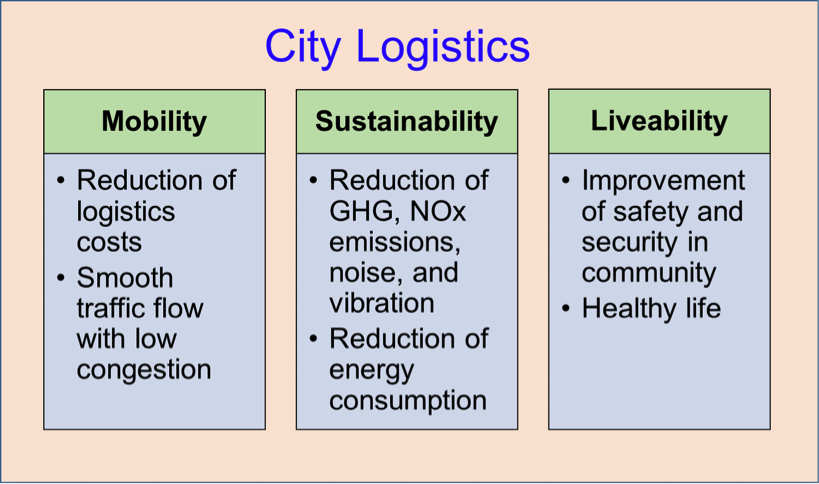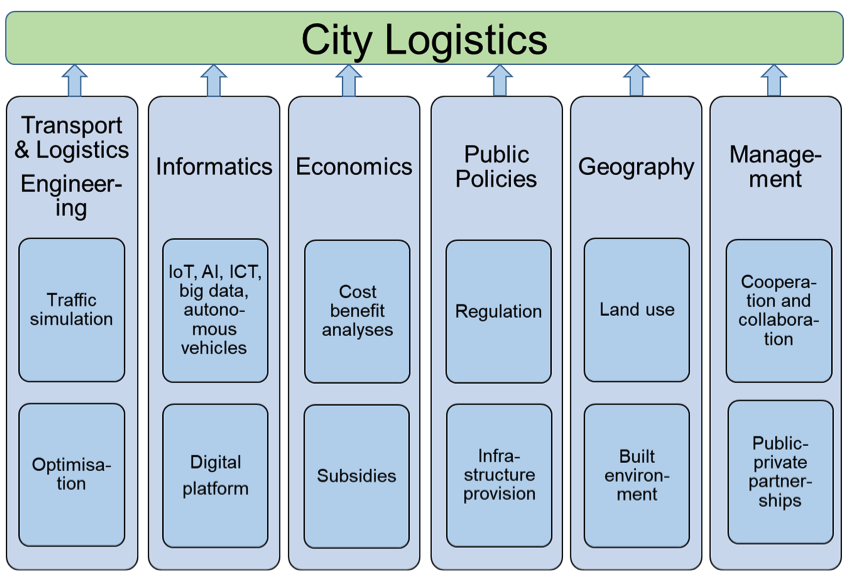Eiichi TaniguchiCity logistics for sustainable and liveable cities持続可能かつ住みやすい都市のためのシティロジスティクス 2020/09/11 AbstractThe research tackles the complicated and important problems of urban freight transport focusing on the use of emerging technologies including Information and Communication Technologies (ICT), Internet of Things (IoT), Artificial Intelligence (AI), and robots as well as the public-private partnerships. It will clarify the innovative solutions for urban freight transport issues for sustainable and liveable cities based on the comparison of policies, strategies, and management schemes in Europe and Japan. 本研究は、ICT、IoT、AI、ロボットなどの先進技術を利用することおよび公民連携などに焦点を当てて複雑かつ重要な都市物流問題に取り組む。そうして欧州および日本における政策、戦略、マネジメント施策の比較に基づいて、持続可能かつ住みやすい都市のための都市物流問題に関する革新的な解決策を明らかにしようとしている。 IntroductionUrban freight transport is important for economic growth and sustainable environment and liveability of cities. The movements of goods and freight vehicles in urban areas have increased due to the increase of e-commerce. However, we face difficult problems of higher costs for urban goods delivery, nuisance including traffic congestion, crashes, Green House Gas (GHG) emissions, local emissions, noise and vibration. For tackling these difficult issues, city logistics have been proposed (Taniguchi et al., 2001) and implemented in several cities around the world. City logistics provides innovative solutions for urban freight transport issues using advanced technologies of Information and Communication Technologies (ICT), Intelligent Transport Systems (ITS), Internet of Things (IoT), Artificial Intelligence (AI), robots and others (Taniguchi et al., 2020). As many stakeholders such as shippers, freight carriers, administrators, and residents are involved in city logistics, collaboration among these stakeholders are essential for successful implementation of city logistics policy measures. Objectives of the researchObjectives of the research are: (a) To clarify the innovative solutions for urban freight transport issues for sustainable and liveable cities, based on the comparison of policies, strategies, and management schemes in several cities in Europe and Japan. (b) To identify the effects of integration of joint delivery systems with urban consolidation centres (UCC) in case studies in Tokyo and Bordeaux. Approaches of the researchThe research subject “city logistics” itself is interdisciplinary which requires wide ranged approaches from transport and logistics engineering, informatics, economics, public policy, geography, management, and others. The discipline of city logistics is aiming at balancing economic growth and the social wellbeing of environmental friendliness, safety, security, and energy efficiency in urban areas. City logistics has three goals (Figure 1): mobility, sustainability, and liveability. The objectives of city logistics encompass the reduction of logistics costs as well as the decrease of greenhouse gas (GHG) emissions and energy, and the improvement of safety and security in community. Therefore, we need to do interdisciplinary studies for tackling the complicated urban freight transport issues.  Figure 1 Three goals of city logistics The research takes interdisciplinary approaches as given in Figure 2, including transport and logistics engineering, informatics, economics, public policies, geography, and management (Firdausiyah et al., 2019, Diziain et al., 2014, Gonzalez-Feliu et al., 2014, 2015, Taniguchi et al., 2018, Dupas et al., 2020, Duin et al., 2007, 2017). The comprehensive studies on city logistics will be performed based on the interdisciplinary approaches including these 6 research areas within the networking group of researchers. Interactions between different approaches need to be taken into consideration and harmonised to integrate each investigation into the innovative solutions of city logistics for sustainable and liveable cities.  Figure 2 Interdisciplinary approaches to city logistics 4 Research methods(a) Analyses of policies, strategies, and management on city logistics in European and Japanese cities The research will classify the city logistics policies and analyse these policies from the viewpoints : (i) what is the essential breakthrough to overcome the difficulties in implementing city logistics schemes, (ii) how the innovative technologies are applied, (iii) how sharing data and resources is achieved among stakeholders, (iv) what is the role of municipalities for promoting city logistics, (v) what is the generic principle of city logistics which is plausible to any cities (vi) how harmonising passenger traffic and freight transport on urban road network is achieved. (b) Case studies on joint delivery systems with UCC in Tokyo and Bordeaux Case studies will be performed using the multi-commodity network flow model (Dupas et al., 2020) to clarify the effects of integration of UCC in Tokyo in terms of logistics costs as well as CO2, NOx and Suspended Particle Material (SPM) emissions by the integration of UCC. As no UCC is currently used in Bordeaux, we will investigate the benefits and issues of using UCC and the integration of UCC in Bordeaux case by discussions with researchers and administrators in Bordeaux who are responsible for urban planning relating to freight transport in Bordeaux region.(c) Synthesis The research (a) and (b) will be summarised to provide a report on the city logistics in Europe and Japan. Expected resultsExpected results based on the research are: (a) Propose the framework for policies, strategies, and management of city logistics for sustainable and liveable cities, based on the analyses on urban freight policies and strategies in European and Japanese cities. (b) Clarify the effects of innovative technologies including ICT, ITS, IoT, AI, robots and autonomous vehicles on city logistics and show how we can apply these technologies to establish efficient and environmentally friendly urban freight transport. (c) Highlight the importance of collaborations between public authorities and private companies in terms of data and resource sharing. (d) Identify the benefits and challenges of integration of joint delivery systems with UCC in case studies in Tokyo and Bordeaux in terms of logistics costs and GHG emissions. ReferencesTaniguchi, E., Thompson, R.G., Yamada, T. and van Duin, R. (2001). City Logistics --- Network modelling and Intelligent Transport Systems. Pergamon, Oxford.Firdausiyah, N., Taniguchi, E. and Qureshi, A.G., (2019). Modeling City Logistics using Adaptive Dynamic Programming based Multi-Agent Simulation, Transportation Research Part E, 125, 74-96. Taniguchi, E., Thompson, R.G. and Qureshi, A.G., (2020). Modelling city logistics using recent innovative technologies, Transportation Research Procedia, 46, 3-12. Diziain, D., Taniguchi, E. and Dablanc, L. (2014). Urban Logistics by Rail and Waterways in France and Japan. Procedia - Social and Behavioral Sciences, 125C, 159-170. Gonzalez-Feliu, J., Taniguchi, E. and d’Arcier, B.F., (2014). Financing urban logistics projects: From public utility to public-private partnerships, In: Gonzalez-Feliu, J., Semet, F. and Routier J.-L. (eds.) Sustainable urban logistics: Concepts, methods and information systems, Springer, Berlin, 245-265. Gonzalez-Feliu, J., Muñuzuri, J., Cedillo-Campos, M.G., Ambrosini, C., Taniguchi, E. and Chiabaut, N. (2015) Contraintes de livraison et politiques d’accès au centre-ville: à la recherche du «véhicule optimal» urbain par une simulation de scénarios, Logistique & Management, 23(2), 31-44. Taniguchi, E., Dupas, R., Deschamps, J-C. and Qureshi, A.G., (2018). Concepts of an integrated platform for innovative city logistics with urban consolidation centres and transhipment points, In: E. Taniguchi and R.G. Thompson (Eds.) City Logistics 3 -Towards Sustainable and Liveable Cities, 129-146, Wiley-ISTE, London. Dupas, R., Taniguchi, E., Deschamps, J-C. and Qureshi, A.G., (2020). A multi-commodity network flow model for sustainable performance evaluation in city logistics: Application to the distribution of multi-tenant buildings in Tokyo, Sustainability, 12(6); 2180. Duin, van R., Tavasszy, L.A. and Taniguchi, E., (2007). Real time simulation of auctioning and re-scheduling processes in hybrid freight markets, Transportation Research, Part B. , B41(9), 1050-1066. Duin, van R., Kolck, van N., Anand, N., Tavasszy, L. and Taniguchi, E., (2012). Towards an agent-based modelling for the evaluation of dynamic usage of urban distribution centres, Procedia-Social and Behavioral Sciences, 39, 333-348. |
 |
Recherche |  |
FFJ Research Statement |  |
Eiichi Taniguchi |
| Inscrivez-vous à notre Lettre en cliquant ici |
*En cas de problème, vous pouvez aussi vous inscrire en envoyant un mail à sympa@ehess.fr, avec pour titre "subscribe ffj_french_news".






